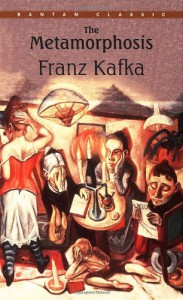Society's Burdens

Normally I would try to write my post fairly soon after I have read a particular piece of literature, however in this instance I was meeting up with a book club today so I decided that I would hold off until after I have been to the group. I must say that this group is quite different than the other book club I attended because the other one spends an hour talking about the book, and when finished they move on to the reading circle in which we all share the books that we have been reading after which we all pack up and go home. This new group talks about the book, and then goes off and starts talking about a bunch of other stuff, sometimes connected, sometimes not. For instance we ended up talking a lot about language, probably because we find language fascinating, and a number of us do know more than one language.
As for this particular novella I must say that it has layers upon layers of meaning, but the main essence of the story is what could be considered to be an attack against utilitarianism. The basic premise is that the protagonist of the book, Gregor, wakes up one morning to discover that he has changed into a filthy vermin (ungeheueren Ungeziefer), which some have translated into a giant insect. Though I initially pictured him as being a preying mantis I feel that a cockroach is probably more appropriate (since he does climb over the walls, has a lot of difficulties turning over when he is lying on his back, and it is probably one of the more filthier insects around).
It appears that this particular story could be an attack against the more utilitarian aspect of society, particularly in the sense that unless you have a use in society then you are not needed: are a burden and should be discarded. It is interesting to note that it is only Gregor who is consider to be the burden because it appears that he is the only bread winner in the family. However, there is also the aspect of illness and disease back in those days. Okay, this book was written in 1915, and medical science was quite different, but you still get the impression that unless you are fit and healthy then you are a burden, and a problem, which is the case with poor Gregor. Firstly we notice that because of Gregor the family is effectively outcast (the boarders do not want to have a bar of the family once they discover Gregor living in the room), and then they also keep him locked away, and Gregor learns his place by remaining hidden whenever the door is opened.
In a way Gregor, who is diseased, disabled, or whatever (which is what the metaphor of the filthy vermin means to me), it is clear that his family do not want to deal with him, and society doed not want to have to deal with that family either. As such the family is outcast until such a time as they can dispose of Gregor. Yet he is slowly being turned into a beast, and a monster despite the fact that he clings onto his humanity. For instance he grabs hold of the painting of the woman, the last human item that has been left in the room, because of that desire to try to remain human, however this fails because he knows that he has become an outcast and can no longer interact with, or even communicate with, other humans.
One sometimes wonders if much has changed since those days. Living in Australia (up until recently that is) we had considered ourselves a lucky country, however as one particular member of parliament has said, 'the age of entitlement is over'. This suggests that the government of the day has developed this belief that it no longer wants to support those who cannot support themselves, and has taken that attitude that these particular people are little more than a burden to the state, a burden that the state simply cannot afford. While this has began to change in a number of states in the Anglo-sphere, it appears that this has always been the case in the United States, which is why you have such a high rate of homelessness. I am not speaking about the lazy and the indolent, but rather those that simply cannot work and now have no means of supporting themselves. In a way we are viewing them as Gregor's family viewed him, as ungeheueren Ungeziefer, people that have no use to the society and are simply vermin. The question that I raise is have we now gone full circle? It was not long ago that disabled and diseased people where simply thrown out of the city and left to die. Is this the case now, that those of us who do not have a family, and do not have any care or support, are simply thrown outside and forgotten, left to struggle and die, lost, alone, and unloved?
 3
3


